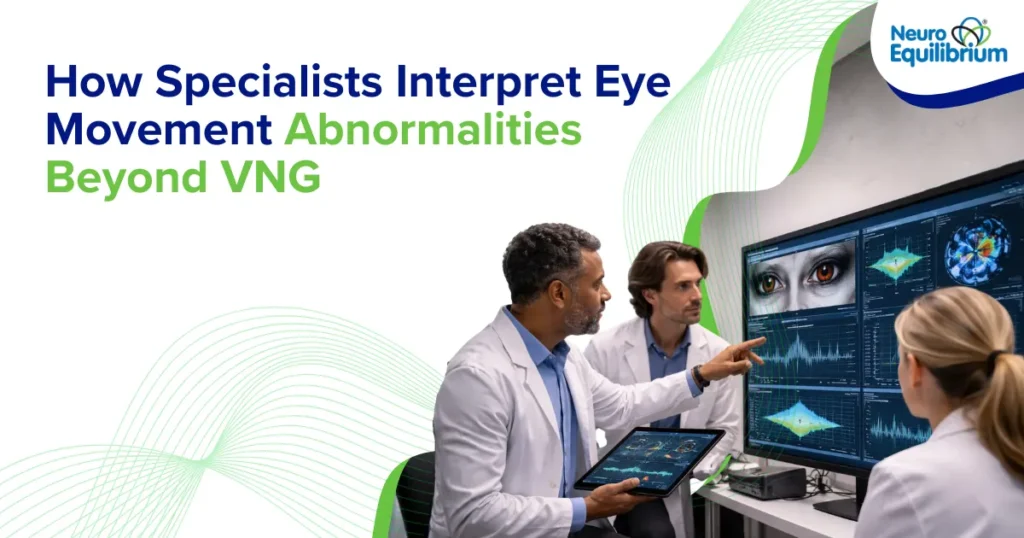Vertigo is not a mere dizziness. Most individuals feel the world is moving, spinning or swaying even when they are in a place that seems to be stable. It can render even such simple tasks as getting around a room, climbing stairs, or lying down uncomfortable despite the fact that the primary approaches to the treatment of vertigo are medications, repositioning of the body, and vestibular rehabilitation therapy, diet and lifestyle seem to be an important part of the treatment of the majority of patients.
Eating patterns, drinking, sleep patterns and even your way to deal with stress can affect the frequency and severity of vertigo. Although these changes may not fully eliminate vertigo, they would allow you to decrease flare-ups and enhance the quality of life in general. Note that these changes only form a portion of an overall treatment plan under the guidance of a professional healthcare expert.
We will attempt to look at the most effective dieting and lifestyle changes that may be helpful during treatment of vertigo.
Know More About
- How Vertigo Is Diagnosed at NeuroEquilibrium
- Do You Need a Vertigo Specialist?
- Can Vertigo Be Cured Permanently?
I Dietary Modifications
The food and drinks you consume directly affect the balance and dizziness factors of your body, like fluid balance, circulation, and the nervous system. Diet is an often-utilized pillar in symptom control in people with Meniere’s disease or vestibular migraine. Though you might be having a different cause to the vertigo, a balanced diet will enable your body to recover faster.
1. Sodium Reduction
Why it matters:
Consuming too much sodium can lead to your body holding onto extra fluid. This build-up can especially affect individuals with inner ear conditions like Meniere’s disease, potentially disrupting the delicate fluid balance in the inner ear and leading to more frequent or severe symptoms of vertigo.
Practical tips:
- Read labels carefully. Foods in packages contain much more salt than you think they do.
- It’s best to limit processed meats, such as ham, salami, and bacon
- Replacing commercially-prepared soups and sauces with homemade.
- Use alternative flavor ingredients such as garlic, ginger, chili, lemon juice and fresh herbs instead of salt.
- Limit sodium intake to around 1,500–2,000 mg daily (as directed by your doctor).
Patients who lower their sodium intake may experience less ear fullness, along with fewer hearing changes and related incidents of vertigo.
2. Hydration Maintenance
Why it matters:
Dehydration will make you feel lightheaded and dizzy. It also has the ability to reduce blood pressure which consequently influences the amount of blood and oxygen flow to the brain. In individuals easily affected by vertigo, it can trigger an episode or exacerbate the symptoms.
Practical tips:
- Get 2-3 liters of water in a day.
- Drink small amounts of water throughout the day instead of gulping large quantities at once.
- Electrolyte-rich fluids, however, must be added during hot weather or after an activity but it must be fluid with fewer calories and sodium.
- Carry a water bottle as a reminder to drink regularly.
Maintaining even simple hydration habits can really help keep your balance steady. This way, you might find it easier to avoid those dizzy spells that sometimes happen when you’re tired or dehydrated.
3. Caffeine and Alcohol Moderation
Why it matters:
Both alcohol and caffeine influence the inner ear and the brain. Caffeine is a stimulant that energizes the nervous system and acts as a mild diuretic, which can lead to some fluid loss. Alcohol alters fluid balance in the ear and may alter blood pressure and induce more severe symptoms.
Practical tips:
- Restrict coffee, hard tea, colas, and energy drinks. You can use decaf or herbal tea in case you miss the ritual.
- Watch the frequency of episodes when you take alcohol. Some people are particularly provoked by red wine.
- Complete avoidance trial periods to see whether the symptoms get better.
Some patients find that removing caffeine or alcohol significantly reduces the number of dizziness episodes.
4. Identification and Avoidance of Food Triggers
Why it matters:
For people with vestibular migraine, food triggers are common. Certain ingredients can set off migraines, which often present with vertigo as a primary symptom.
Common triggers include:
- Aged cheeses
- Chocolate
- Processed meats (pepperoni, salami)
- Foods with MSG (monosodium glutamate)
- Artificial sweeteners
- Red wine
Practical tips:
- Keep a food and symptom diary. Record the foods you take and record about any feeling of dizziness, headaches or nausea.
- An elimination diet involves avoiding all possible triggers for 2-4 weeks, then slowly reintroducing each one. This approach helps identify what might be causing vertigo.
- Focus on fresh, whole foods. Whole grains, low-fat sources of protein, fruits and vegetables are mostly safe.
It is an extremely slow process and it may cause the patients to feel in control as distinct patterns between dizziness and diet are developed.
5. Blood Sugar Stabilisation
Why it matters:
Rapid changes in blood sugar can make anyone feel faint or dizzy, but for someone already dealing with vertigo, it can feel much worse. Skipping meals or relying on high-sugar foods causes spikes and crashes that stress the nervous system.
Practical tips:
- Eat small and balanced meals three or four times a day.
- Substitute with complex carbohydrates (brown rice, oats, whole wheat bread) and protein (chicken, eggs, legumes) and healthy fats (nuts, olive oil, avocado).
- Never skip breakfast; low morning blood sugar is a common trigger for dizziness.
- Limit processed snacks and refined sugar.
Keeping the level of sugar in the blood of pregnant women constant is highly important, because the dizziness during the course of pregnancy can be complicated by the nutritional needs.
6. Supportive Nutrients
The vitamins and the minerals are useful in supplying the nervous system and maintaining balance. They do not replace treatment but lack worsen symptoms.
- Vitamin D: Low levels of vitamin D have been linked to higher rates of BPPV (a common vertigo disorder). They can be helped using sunlight, fortified foods and supplements but make sure you check the levels.
- Magnesium: Magnesium is a mineral typically administered to patients with migraines and it is concerned with nerve conduction and muscle relaxation.
- Vitamin B12 and Folate: Its deficiency can cause lightheadedness in the nerves. Adequate consumption will be an added advantage regarding overall neurological health.
Always consult a doctor before starting supplements, as overuse can cause complications. Over-supplementation brings about other challenges.

II. Lifestyle Adjustments
Food is only one piece of the puzzle. Your lifestyle habits, how you sleep, manage stress, and move throughout the day also shape how your body responds to vertigo.
1. Stress Management
Why it matters:
Stress does not directly cause most vertigo cases, but can cause or worsen episodes. Anxiety is likely to lead to fast breathing, muscle tension, and sleeplessness which are also certain to leave an individual feeling dizzy. One of the most common causes of vestibular migraine is stress.
Practical techniques:
- Deep breathing: Take a moment to breathe deeply. Inhale slowly for 4 seconds, then exhale gently for 6 seconds. Feel free to repeat this calming practice for a few minutes to help you relax.
- Yoga or tai chi: Light activity may be calming to the nervous system and may as well increase balance.
- Mindfulness meditation: It may be simple to begin with apps or brief guided videos.
- CBT (Cognitive Behavioural Therapy): CBT is applied when the individual feels dizzy due to anxiety, the treatment is directed at changing the negative thinking and finding coping strategies.
Patients are likely to find that coping with stress does not only cause them to be less dizzy but also to feel more in control of their disease.
2. Sleep Hygiene
Why it matters:
Sleep restores the brain and nervous system. Poor sleep can increase migraine risk, worsen dizziness, and delay recovery from vertigo.
Practical tips:
- Aim for 7–9 hours of sleep each night.
- Keep a routine: go to bed and get up at the same time each day.
- Do not take caffeine at night.
- Having a 30-minute or more screen-off time before sleep is better because light interferes with the production of melatonin.
- Make the bedroom cool and dark and quiet.
Better sleep often leads to fewer and less intense vertigo episodes.
3. Identify and Avoid Movement or Environmental Triggers
Why it matters:
Vertigo may be produced by certain movements of the head or by some environments. The triggers in the case of BPPV include the extension of the head back or turning in bed. When it comes to vestibular migraine, flashing lights or spending too much time in front of the screen may worsen the symptoms.
Practical tips:
- Take a moment to adjust your position, especially when getting out of bed.
- When sleeping, place a pillow in such a way that your head is slightly raised.
- Take regular screen breaks and on overly sensitive screens use darker screens.
- Do not spend long days in bed. The symptoms can even exist when a person is idle.
Learning to recognize personal triggers is one of the most effective ways to reduce dizziness day-to-day.
4. Gentle Exercise and Movement
Why it matters:
Staying still due to the fear of dizziness may backfire, which makes the balance system weaker and extends the recovery. Light, restrained movements can recondition the brain to deal with the issue of balance.
Examples:
- Movement on a flat surface at a steady pace.
- Tai chi involves a combination of slow and flowing movements, as well as balance training.
- Yoga that emphasizes poses without requiring head movement at advanced levels can be especially beneficial. It allows practitioners to focus on their breath and body awareness, creating a calming and accessible practice for many. Whether you’re new to yoga or looking for a gentler approach, these poses provide a great way to enjoy the benefits of yoga in a safe and reassuring way.
- Eye-head coordination and stimulation of the vestibulo-ocular reflex can be achieved through simple coordination exercises such as juggling.
Caution: Skip activities that involve sudden head turns or intense balance challenges until cleared by your doctor.
5. Post-Maneuver Care for BPPV
If you’ve had a repositioning maneuver like the Epley, follow your doctor’s advice carefully.
- The first night or two you must sleep a little high on your head.
- Do not lie on the side of the afflicted.
- Avoid bending or leaning backward for at least 24 hours.
- Wait 10 minutes before getting on your feet after the procedure.
These small steps help keep the inner ear crystals in place and reduce the risk of immediate recurrence.
6. Fall Prevention Strategies
Why it matters:
Vertigo increases the risk of falls, especially in older adults. A fall can lead to fractures, loss of independence, and reduced confidence in mobility.
Strategies:
Install grab rails in the shower room and along the stairs to add safety. Ensure there’s good lighting and an open, inviting floor space. Place non-slip mats inside the shower to prevent slips. Remember, balance and strength exercises like walking on your heels and toes can really help maintain mobility and confidence squatting.
Creating a safer home and staying physically active can really boost patients’ confidence in their daily routine activities.
7. Addressing Other Health Issues
In some cases, unrelated illnesses or drugs aggravate vertigo.
- Dizziness may occur with changes in blood pressure (orthostatic hypotension) when one stands up.
- Anaemia decreases oxygen supply to the brain.
- Uncontrolled diabetes may result in nerve damage and blood sugar variations.
- The deficiency of vitamin D may enhance the recurrence of BPPV.
Moreover, certain drugs, including antihypertensives or tranquilizers, can also aggravate dizziness. Discuss your medication list with your physician regularly. A single prescription alteration/change can cause vertigo to become considerably easier to deal with.
Conclusion
NeuroEquilibrium can be used to make the treatment of vertigo more effective by providing a single plan that is customized to your specific needs. It helps you to make little yet effective changes to your lifestyle like reducing the amount of sodium, maintaining fluid intake, balancing food, and minimizing caffeine and alcohol. On top of nutrition, NeuroEquilibrium will facilitate stress management, enhance sleep quality, inspire safe movement practices, and fall-prevention practices. By recommending and monitoring your progress, it makes a well-defined and customized highway that reinforces your balance system, and helps you recover in the long term.
Sources
- Altın B., et al. (2022). Is Inadequate Water Intake a Risk Factor for Vestibular Disorders? PMC. https://pmc.ncbi.nlm.nih.gov/articles/PMC10682806/ (PMC)
- Gunes-Bayir A., Tandogan Z., Gedik-Toker Ö., Yabaci-Tak A., & Dadak A. (2023). A Comparison Study of Nutritional Assessment, Diet and Physical Activity Habits, Lifestyle and Socio-Demographic Characteristics in Individuals with and without Dizziness/Vertigo. Nutrients, 15(18), 4055. https://doi.org/10.3390/nu15184055 (MDPI)
- “A Healthy Diet for Managing Vertigo.” Abbott Care. https://acare.abbott.com/en/articles/neurology/healthy-diet-for-managing-vertigo/ (Acare Global)
- “What to Eat and Not to Eat if You Suffer from Dizziness.” Amplifon. https://www.amplifon.com/uk/audiology-magazine/diet-for-vertigo (Amplifon)
- “Diet Chart for Vertigo Patients: Foods to Eat & Avoid.” HomeocareClinic. https://www.homeocareclinic.in/diet-chart-for-vertigo/ (homeocareclinic.in)
- “The Vertigo Diet: Managing Vertigo With Essential Foods.” Rupa Health. https://www.rupahealth.com/post/vertigo-diet-manage-symptoms (Rupa Health)
- “Eating Well with Balance and Dizziness Disorders.” Balance and Dizziness Canada. https://balanceanddizziness.org/help-yourself/eating-well/ (balanceanddizziness.org)
- “The Best Diet For Vertigo.” Integrity Physio. https://www.integrityphysio.com.au/blog/the-best-diet-for-vertigo/ (integrityphysio.com.au)
1. Can diet alone cure vertigo?
No. Diet is able to alleviate triggers and it can be part of recovery, though medical examination is generally involved in vertigo treatment, and maneuvers, medications, or therapy can be used.
2. How quickly will I notice improvements after changing my diet?
Other individuals confirm a change in a few weeks, particularly when there is lesser sodium or caffeine. For others, it may take longer. Consistency is key.
3. Is exercise safe if I have vertigo?
Yes, there are some safe and prescribed light activities such as walks or Tai Chi. Meanwhile, hold your head straight till your doctor clears you.
4. Can supplements really help with vertigo?
They could assist in case of a deficiency of some nutrients such as vitamin D, magnesium or B12. Never use supplements without consulting your doctor.
5. What’s the most important lifestyle change for vertigo?
It depends on the person. To others, salt reduction is the best solution. To others, stress management or sleep are the most important differences. Maintaining a symptom journal can be used to determine what is most effective.
















